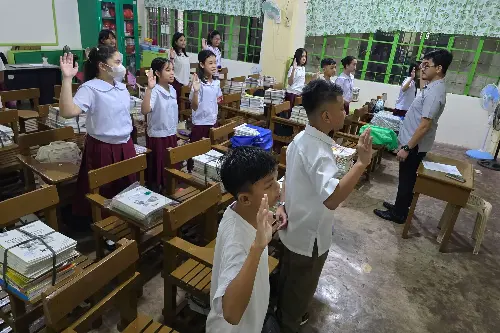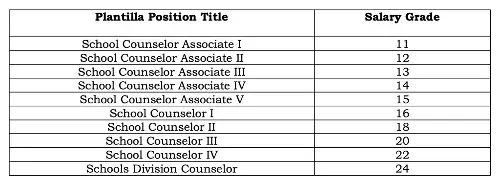
Education Secretary Sonny Angara on Tuesday, March 4, signed the implementing rules and regulations (IRR) of the Basic Education Mental Health and Well-being Promotion Act that aims to “foster and protect the holistic well-being” of Filipino students in both public and private schools.
The school-based mental health law or Republic Act No. 12080 is crucial, as the Philippines has been dubbed the “bullying capital of the world” due to the high prevalence of bullying cases in schools.
A report by the Second Congressional Commission on Education showed that the “outdated” definition of bullying and the shortage of guidance counselors have worsened the issue. Teachers often lack clarity on what constitutes bullying and are not equipped with the knowledge to address such cases effectively. (READ: What is bullying? ‘Outdated’ definition in Philippines poses problems)
Department of Education (DepEd) data show only 38 out of 339 bullying cases were resolved from November 2022 to July 2024.

“Sa pagpapatupad ng batas na ito, titiyakin natin na hindi lang ito magiging isang polisiya, kundi isang konkretong hakbang upang matiyak na may malalapitan ang bawat estudyante at guro sa oras ng pangangailangan,” Angara said.
(With the implementation of this law, we will ensure that it will not just be a policy, but a concrete step to ensure that every student and teacher will have someone to turn to in times of need.)
Below are some of the key provisions of the school-based mental health law.
Care centers in schools
Under the IRR, every school in the country is required to have a care center equipped with “functional physical facilities, including the necessary tools, materials, and infrastructure to provide school-based mental health services.”
All existing guidance counselor offices will be converted into care centers. The DepEd will establish the minimum standards for setting up these care centers.
Each care center will be led by a school counselor — either a registered guidance counselor or a registered psychologist — who will report to the schools division counselor of the Mental Health and Well-Being Office at the division level. The school counselor will be supported by a school counselor associate and other personnel.
Here are the functions of the care centers:
- Develop a “localized” school-based mental health program to strengthen existing DepEd programs.
- Render counseling when the care center has a school counselor or facilitate the referral to the schools division counselor for counseling when it has only a school counselor associate.
- Maintain comprehensive counseling records through case notes that include students’ information, records, and interventions.
- Equip students with skills and information for prevention, identification, and proper response for their own mental health needs.
- Train and support teachers to improve mental health awareness and preparedness to enable them to identify early warnings of mental health issues.
- Facilitate “efficient” referral to appropriate agencies, institutions, organizations, or professionals for necessary intervention and aftercare support in addressing mental health concerns.
- Engage and provide support to parents in improving students’ behavior in school and ensuring their academic success.
- Prepare and submit reports periodically to division offices.
- Provide referral for school personnel in need of counseling.
New positions
Under the IRR, the Department of Budget and Management, in consultation with the DepEd and the Civil Service Commission, created new plantilla positions to ensure there would be personnel for the implementation of school-based mental health services.
Why does this matter? The Philippines faces a shortage of guidance counselors due to the qualifications required for hiring, particularly the master’s degree requirement.
While a master’s degree is still necessary to become a guidance counselor, the government has created a new position for counselor associates. This role requires only a bachelor’s degree in psychology or guidance counseling, or any bachelor’s degree with 18 units in behavioral sciences, including at least 200 hours of supervised practicum. This adjustment helps address the shortage and ensures that more schools can have personnel to support mental health services.

“Until the plantilla positions for School Counselor and School Counselor Associates are filled up, the DepEd may assign teachers or other DepEd personnel to deliver school-based mental health services supervised by the School Counselor in school, if available, or by the Schools Division Counselor,” the IRR reads.
Below is a full copy of the IRR.
– Rappler.com
